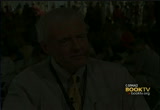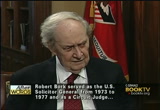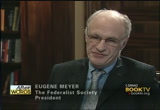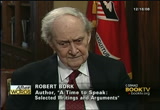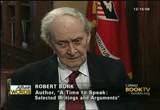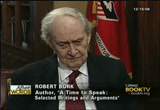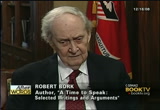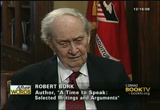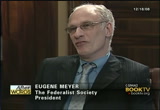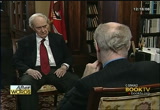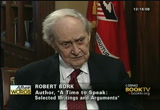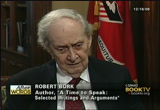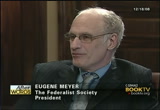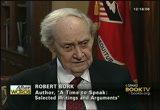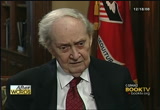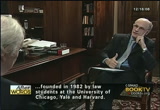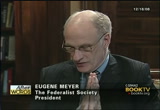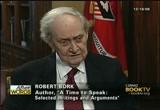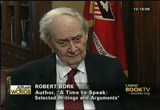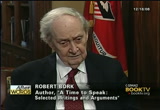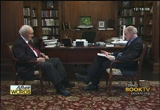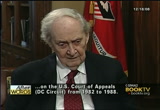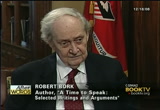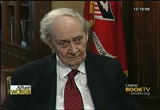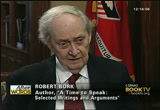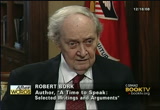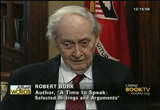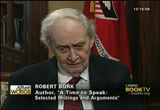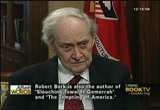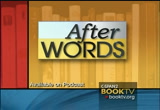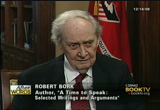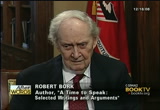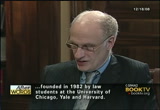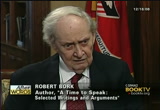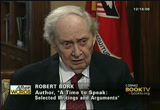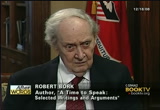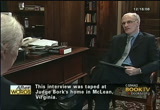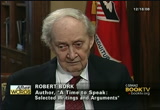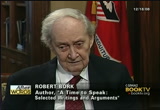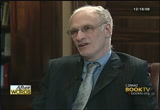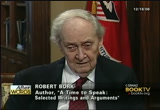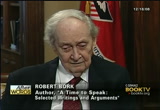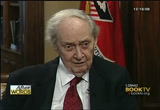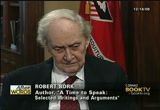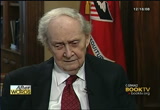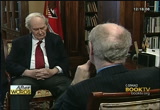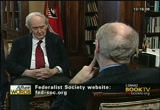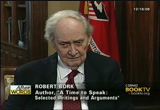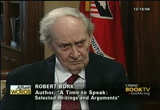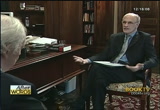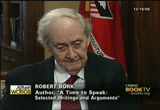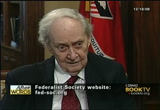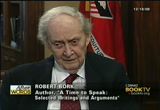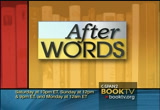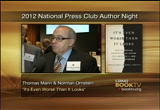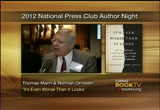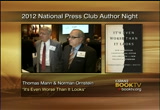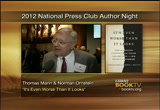tv Book TV CSPAN December 22, 2012 1:00pm-2:00pm EST
1:00 pm
"hemingway's boat" is the name of the book. thank you for joining us on booktv. .. >> in little america: the war within the war for afghanistan, washington post senior correspondent rajiv command sake ran reports on the military and the government's failings in the war in afghanistan. nancy gibbs, editor at large and michael duffy, executive editor for time magazine, chronicle the
1:01 pm
relationship of the u.s. presidents in "the presidents club: inside the world's most exclusive fraternity." and kevin phillips recounts what he believes was the most important year of the american revolution which was 1775, a good year for revolutions. for an extended list of links to various publications 2012 notable book selections, visit booktv.org or our facebook page, facebook.com/booktv. >> in 2008 judge robert bork sat down with eugene meyer, president of the federalist society, on booktv's "after words," an hourlong interview program. judge bork discussed a collection of his written works spanning nearly four decades. this interview was taped at judge bork's home in virginia. judge robert bork died on december 19, 2012.
1:02 pm
>> host: why did you, why did you collect "a time to speak," and is this just a book for lawyers? >> guest: well, i tried to do the articles in one year or because the intercollegiate studies institute approached me and asked me to collect, to make a selection they could publish. so i did. and, of course, this is not a book for lawyers. finish some of the comments i have so far on early readers like the two articles at the end about martinis which is not exclusively a taste for lawyers. no, it's, it's written -- i don't think there's any legal jargon in that whole book. i remember when i first published an article with "fortune" magazine calls the crisis in antitrust, which is in
1:03 pm
there, they showed it to their outside law firm, sent back word that i was not a lawyer, i was a fraud, because lawyers don't write that way. so they -- [laughter] they got nervous and called my old law firm and was assured that i was a lawyer. [laughter] but i don't really admire much legal style of writing. there's no need for it. you can express the ideas of a law or the ideas about the culture in a variety of ways without any jargon and perfectly plain english that anybody can understand. and that, i have to do that in those books because a lot of those articles in there appeared in popular journals. >> host: yeah. it did seem very, the articles were very clear and not typical of legal writing. um, i wanted to ask you, president obama's talked about the need for judges with
1:04 pm
empathy. and i wallet today ask you, have -- i wanted to ask you, have judges strayed from the role they should be playing, and what do you think of president-elect obama's plans for appointing judges? >> guest: well, i'm a little -- i would be even more concerned about obama's view of judges except for the fact that the likely resignations from the supreme court are the liberals. they're the age to begin retiring. so his appointments would probably be younger liberals replacing older liberals on the supreme court. where obama's views are going to be, have real impact are in the lower federal courts. now, that's important because almost none, almost none of the cases in the lower federal courts get to the supreme court. i forget, there are tens of thousands of cases every year in the lower federal courts, and the supreme court takes about 80
1:05 pm
which means that most to have laws being made by lower courts which obama will have a chance to, to affect. and he has said that he wants judges -- in the first place, he says that the law is clear in all but 1% of the cases which is definitely not true. wouldn't be any room for argument if it was that clear. but he says in those cases where the law isn't clear, he wants a judge who will be sympathetic to the poor, to the disabled and so forth. now, that's a at the same time that if the statute or the decisions don't support this poor person or that disabled person, he wants a judge who will perhaps stray from the law to enact his social sympathies. and that worries me because once that starts, and it has started
1:06 pm
already, you begin to get a lawless court. and nobody can rely upon the court for evenhanded justice. >> host: yeah, it's -- one of the things, i guess, i wanted, you've talked a lot about the intentions of the framers and originalism. what's the, what is the difference between originalism and original meaning and judicial restrain? are they all the same thing? >> guest: well, originalism, i think we had to define that because there is now a large debate taking place in the academic world and in the political world about original understanding. and what it is, is the theory, the idea that a judge should look to the principles of the constitution as they were originally understood, as they were understood when the
1:07 pm
constitution became law. not, and not wander off into principles or results that were not conceivably understand -- understood. and much of our law now is law that the framers and the people who made the constitution law would never put up with. >> you you know, most people ina given legal case tend to look at the result, and they think the decision is good if they lie the result. >> guest: oh, yes. quite educated people make that mistake. i remember morgan kondraki on television. when the texas homosexual sodomy case came up, he said the only issue was whether you wanted to see homosexuals in jail. that's not the issue at the case
1:08 pm
at all, who should make the law; the legislature or the court? when there is no law to begin with until somebody acts? >> host: are there thing thingst the, major things that the constitution doesn't protect against? is there, are there a lot of bad things that can happen which the constitution doesn't address? >> guest: well, no. i can't think of any bad things that are going to happen. the laws may be passed that i don't like, but i can't classify that automatically as a bad thing. i remember a student asking me did the constitution protect marriage. well, it doesn't really. they didn't think anybody was insane enough to get rid of marriage. and nobody is. but the student said he couldn't put up with any theory that didn't protect marriage. now, that's a hypothetical about
1:09 pm
a horrible world which is never going to come to pass, but those hypotheticals are used as arguments to shape the law. and there's some theory that if the constitution doesn't protect it, it's not protected. the main protection the american people have is the understanding of the american people about the laws they pass. not about the constitution. in fact, most of our freedoms are in statutory law, not in constitutional law. >> host: um, you took a couple other things i -- >> guest: i said a couple of other things there. i hope you haven't got the embarrassing one, but go ahead. >> host: i only have a couple of the embarrassing ones. you said that an intentionallist, and by -- this was a quote in the early '60s that you have -- intentionallist
1:10 pm
requires text, structure and history of the constitution provide him not with a conclusion, but with a major premise. the premise states a core value that the framers intended to protect. the intentionallist judge must then supply the minor premise in order to protect the circumstances the framers could not foresee. that's an interesting and slightly different explanation than i've heard some other people give, and i'm wondering whether you think there could be a problem there with when the judges are supplying the minor premise that they are introducing their own ideas and not following the constitution -- >> guest: it's inevitable when a judge decides a case that to some degree he's used his own ideas. because he has to ask, is this case within that principle? and that doesn't come automatically. let me give you an example. the fourth amendment of the constitution says that there
1:11 pm
should be no unreasonable -- there should be no unreasonable searches and seizures. when they wrote that, they were thinking about the constable chomping through your house -- chomping through your house or into your office and seizing papers. then as technology changed and the government had the ability to put a electronic device, listen in your house or your office without your knowing it, the court took a little while to get around that. but they finally understood that the principle was the same. now, the major premise is no unreasonable searches and seizures. the minor premise is this thing a search and seizure. and that's, i don't think that gives a judge too much latitude. it's what judges have to do in every case in applying a
1:12 pm
principle to new circumstances. >> host: when, is there ever a case when a court is justified in a ruling that's not clearly required by the constitution or the clear language of a statute? in your book you seem to suggest that bush v. gore might have been such a bays. such a case. was it? >> guest: no, i don't think so. the concurring opinion by rehnquist, scalia and thomas and so forth was based upon the statute and was preferable to the majority opinion in that respect. but i, you can't say that the judge must only act when the principle is clear because there will be principles, but there will be applications of a principle that are not clear.
1:13 pm
and he has to do the best he can without distorting the shape of the law, but nevertheless getting the spirit of the law and the principle of the law into the case correctly. >> host: how does that, how much wiggle room does that give a judge? in other words, is that just kind of the way it is, or can a -- does that make it so that a judge can do whatever a judge wants to do and say, well, you know, i agree with, i agree with judge bork, but many -- but in this case, you know, i had to do the best i could, and it turned out that what will turn out to be the judge's personal preferences are required -- >> guest: no, the idea of following the original understanding of the constitution is not a mechanical idea.
1:14 pm
you don't just take some kind of thing, a machine over there and say, aha, that's the original understanding. it takes a lot of judgment and research to get there. now, scalia and i, we're on the same court, and i think somebody counted -- we voted, when we were together, we vote voted 99% of the time the same way. but we did disagree. and there was a case called oldman against evans which was a libel case against evans and novak, the columnists. and scalia decided that the plaintiff had a good case, i decided he didn't have a good case. well, we were both arguing from what we thought were reasonable premises related to the constitution. we came out differently. that will happen. it's not to be expected of the judges no matter how dill gem, no matter -- diligent, no matter how committed to originalism
1:15 pm
will come out the same every time. they won't. >> host: it's quite fascinating. wanted to switch things slightly different. the madisonian dilemma is at the center of a lot of your writings. i'm wondering if you can describe that briefly. >> guest: yeah. well, i picked up that phrase from a professor at yale university. and the idea is, what he phrased it was that we allow majorities to rule just because they're majorities, for no better reason. in many cases. but we also want some protection from minorities someplace, and you can't allow the majority to decide which freedoms the minority will have, nor can you allow the minority to decide, because they will always claim
1:16 pm
the freedom. which means there's a dilemma at the heart of democracy. and that dilemma is solved in our theory by a court that reconciles those two claims according to law. and that's the madisonian, that's the solution of the madisonian dilemma. madisonian being, referring to james madison, of course. who wrote the famous passages in the federalist papers. >> host: , -- yeah, the question is tricky because when you, when you have a minority, the minority, i guess, is basically protected through the constitution, through the bill of rights? how is the minority protected in our system? >> guest: well, the minority's protected in a couple of ways. one is the forbearance in the
1:17 pm
majority. you know, the majority is not automatically a vicious crowd. they often allow behavior they don't like in the interest of liberty, in sympathy for a minority. and in cases where they don't and the constitution speaks, then the court protects the minority. >> host: one of the things that, switching slightly. your colleague who you described in the book is a great man, and you wrote an appreciation of him in the book -- alexander bickell -- focused on some of this quite a lot. and he also talked, what i thought was a wonderful quote, talking about the tension between the tyrannical tendency of ideas which, and the suicidal emptiness of politics without ideas. >> guest: that's right. >> host: what about that?
1:18 pm
>> guest: well, of course, if you -- he was writing in a period when ideology was everywhere and intense, and he was talking about the fact that ideas, if they are extended, extrapolated beyond a legitimate area, they became tyrannical; equality, socialism. and on the other hand, if politics is just who gets what, who gets the money and who doesn't, then that's an empty politics. it's a politics without ideas. so bickell talked about ideas, he put it ideas in the middle distance, ideas that only go so far and are held tent thattively -- tentatively and which over time will change as the society evolves. and i thought he was a, that's a
1:19 pm
very crude way -- i'm putting it very crudely, but he was very sensitive to these changes in the evolution of a society and thought it was desirable. he objected mightily to the warren court which forced evolution in ways that society did not want. bickell was a great man for a lot of reasons, but one was he was just constantly playing with ideas and working them out, and he was very humorous about it. he died when he was 50, which was too bad because he was on his way to, i think, becoming a important political philosopher. see, the kind of thing that's in
1:20 pm
that book lays the groundwork -- i don't mean i laid the groundwork, but the nature of the tough that's in there -- the stuff that's in there lays the groundwork for political philosophy. law is about ideas. you can't -- when you get an important case, almost any case, you can't go to the library and pick up a volume that'll tell you where the answer is. it's not there. you have to, you have to have a background and a desire to engage in a philosophic enterprise not in constructing a new constitution, but in interpreting the present one and filling in the gaps where there are gaps. i don't mean, i don't mean if the constitution doesn't mention something you make up something,
1:21 pm
but take the first amendment. congress shall make no law abridging the freedom of speech. we know that they didn't mean no law abridging the freedom of sweep. that would mean you couldn't have a law against inciting mutiny in the navy. that would mean you couldn't have a law against people jumping up and down in a courtroom and screaming. we know that there were limits to the speech they would protect. but the language doesn't tell you what those limits are. you have then to go back to the history of the practice or the can customs of the times to find out what those limits are. >> host: the, i want to pick up on that, but also one other thing here. you talked, this seems to me to continue from bickell to some degree, that the institutions and traditions of the american republic including the historic constitution are our best chance for happiness.
1:22 pm
and you express concern throughout your writings about the eroding or wanton destructions of our traditions. can you expand on that at all? >> guest: well, can i explain -- >> host: expand, or -- >> guest: well, the traditions, we have had traditions of what is proper behavior, what is civil behavior and what is decent behavior. and those traditions are eroding rapidly. you only have to look at television to see that intense vulgarity and pornography are gaining at the expense of what we used to regard as civilized, decent behavior. that's an erosion. now, i used to -- i did, in fact, i forget -- argue for censorship, which sends people up in the air. they seem to think that censorship is unthinkable. the truth is in this country we
1:23 pm
had censorship for several centuries, before the 20th century. and we know how it worked, it worked perfectly well. and i had a in a different book, i have a chapter urging censorship thinking about pornography, obscenity and so forth. but i must say now that i look at what's happening, we're now seeing a tendency to censor speech. real speech, political speech. in various ways. hate crimes are now, if you say, if you're mugging somebody and say the wrong words, it's a hate crime. and it's much worse than a, just the crime itself. so i am now in a dilemma. i think censorship's coming
1:24 pm
increasingly to be used to stifle political ideas. in canada that's definitely true in canada. there's a journalist, a marvelous american journalist called mark steyn who wrote a book here, and he and his publisher got sued in canada which does not have a strong first amendment tradition. in an effort -- and three different muslim, by muslims in three different canadian commissions in an effort to stifle him. and that's the kind of censorship that i'm afraid we're going to see increasingly as various groups say we have a right not to be offended by criticism by you. and if you offend us by saying something, we have a right the hold you responsible. >> host: yeah. you wrote earlier that you thought the first amendment was, basically, intended to cover political speech and only political speech. do you still think that? >> yeah, if you -- yes.
1:25 pm
if you look at the function speech serves, and i do that in this, in an article in there called "neutral principles and first amendment problems," justice brandeis specified about five functions of speech, and and only one of them is unique to speech. the others they share with everything else so that there's no reason to single out speech. in those cases for special protection. but political speech is the one kind of thing, the one kind of speech that's essential to run the government and to run our society. however, i've since become convinced that separating political from other forms of speech, scientific speech and so forth, is too difficult. and, -- and i, therefore, wage a
1:26 pm
scaled back version of controlled speech by courts. very much scaled back. >> host: so you would have the courts do very little controlling speech, is what you're saying? >> guest: that's right. well, there's a case which we don't want the to go into right now, but it lays the basis for what i think is a sound approach to speech that can be censored or not censored. it was a 1942 case of a unanimous court. i don't think that case would get a majority vote today in the court because the court has become very relaxed about any kind of utterance that can conceivably be called speech. in fact, they've expanded it from speech to expression so that something that's expressive -- well, for example, they have, the court has decided that nude dancing is expressive. like expressive, all right. what does it express, we need
1:27 pm
not ask. but they said since it's expressive, it's entitled to a degree of constitutional protection. at the same time, the court has said that high school students may not pray before a game, football game, that nobody get hurt because that, religion is ruled out by the constitution. which is not right, but that's what they said. which led ted olsen -- a very prominent attorney -- to say that since nudity was preferred as prayer as a form of communication, perhaps the students ought to dance naked before the ball game. i thought that was all right unless, of course, they got naked by the dance of the seven veils which would bring the aclu down on their heads, because the dance of the seven veils refers, is found in the bible.
1:28 pm
>> host: something religion we get into. what, what have you seen in terms of the trend to have court over time, in terms of, you know -- >> guest: well, it's not just the court. that's one reason i say this book is not just for lawyers by any means. what we're talking about is the movement of the culture. we're talking about the movement of social classes within the culture. and that's reflected in the law. constitutional law isn't out there by itself doing these things. there are other forces in the society impinging upon it. now, i think it's probably true that throughout our history the court has shifted in finding things in the constitution that aren't really there according to the desires of the dominant
1:29 pm
social class of the time. which is why we had in the late 19th century, in the early 20th century we had cases illegitimately protecting business and free enterprise illegitimately in the sense that there's nothing in the constitution to point to that protection. because the business class was then the most popular in the dominant class. since then the intellectual class has come to be the dominant class, variously described as the chattering class, the olympians and so forth. but it's an intellectual class. i hate to use the word "intellectual," because people aren't very good at intellectual work, but they play with words. that's why we call them intellectuals. and the court has shifted now and protects those values, not
1:30 pm
business class values. so we, you can almost trace the movement of a culture by reading the, by reading the court's opinions, or you can look at the culture and predict the court's opinions. now, i don't know that that'll change again, because the intellectual class is constantly growing in this country. and it's quite dominant in the media and universities and elsewhere. we need a take a quick break, and we'll be right back with judge bork and "a time to speak." >> on the go? "after words" is available through itunes and xml. visit booktv.org and click podcasts on the upper left side of the page. select which podcast you'd like to download and listen to "after words" while you travel.
1:31 pm
>> host: you were quoted at one stage about describing the ninth amendment as an inkblot on the constitution. is it? >> guest: yeah. the ninth amendment, maybe we ought to tell people what it is. >> host: yes. >> guest: says that the fact that the rights are not enumerated shall not be used to disparage them. in other words, that there are rights outside the constitution. now, nobody knows what that meant. people go around offering interpretations of something, they don't know what it means. and i said it's like trying to interpret an inkblot. you read a sentence, and you come to an inkblot, you have no idea what's under there, so you begin to interpret it. and that, when i referred to the ninth amendment as an inkblot,
1:32 pm
that enraged people. it would have been the better part of valor not to have said that. but i did. >> host: have you done that often? >> guest: yes. [laughter] >> host: but, so if a judge comes across something either in the constitution or in a statute that is, he cannot figure out what it means, he should ignore it? >> guest: he should say he doesn't know what it means, that he has no guidance in deciding the case. and judges shouldn't just -- i've had, i've been in cases in which the other judge or two said that they didn't know what the language meant. the alien torts claims act being a prime example. but they were sure that congress intended that we interpret it. now, so they would go ahead, and they'd make it up. now, the fact that congress
1:33 pm
wrote something they thought we would interpret, they also thought we'd understand what it meant. but if we don't, there's no, there's no excuse for making up a law and saying we don't know if congress intended this or the reverse. but since they said something, we'll go ahead and decide the case. i think there's no excuse for that. >> host: i want to switch to the area of international law which you've had a section on in your book. justice o'connor says the differences between nations are less important than our similarities. and one of your former clerks, stephen call brees si, has been writing on american exceptionalism. and he's suggesting that in many areas where we differ from the rest of the world, we may well differ because our system is better, and we should emphatically not copy the rest of the world. >> guest: well, i think call
1:34 pm
bris si is closer to the truth that sandra day o'connor was, but i don't think either of them gets it quite right. the point is our judges were handed this document and said this is what you administer, this is what you decide cases by. the fact that somebody in a similar society has a somewhat different document is no reason to say, well, we have more similarities than differences, therefore, we'll pick up their or law and apply it as if it were ours. that doesn't make any sense at all. you're given our constitution to interpret, and that's what you should interpret and not what some modern german philosopher thinks about the nature of constitutional law. >> host: one question i've heard
1:35 pm
asked is why shouldn't our judges not -- borrow from things they think are good opinions in other countries? >> guest: i think i just answered that. >> host: okay. >> guest: justice breyer in one case recommends that we consider the supreme court of india, i believe it is, jamaica and zimbabwe. now, that gets pretty, that gets pretty hilarious. if we're running around looking at zimbabwe's decisions. but i think i've answered that question. our judge has no authority except what is given to him by our law. and why he can pick up somebody else's law, i'll never know. >> host: um, the -- so the current trends in the courts to
1:36 pm
look at international law to the degree -- >> guest: that's window dressing, you know? you get a, you get a case of a juvenile murderer, and the question is juvenile when he murdered, a minor, whether he can be subject to capital punishment. and i begin to cite different state laws, they begin to cite different countries' laws and so forth. what that has to do, for example, if the state of texas makes a crime punishable by capital punishment, why they, why there's any doubt cast upon that law by the fact that connecticut has a different one or by the fact that great britain has a different one, i don't know. under our system texas is a sovereign state entitled to have it own public policies unless they run contrary to the
1:37 pm
constitution. and fact that they run contrary to connecticut and great britain is not contrary to the constitution. so i think, i think it's a hoax anyway because i think the court would decide the same way whether or not it cited foreign law. because i think the foreign law's in there for window dressing. >> host: the, the sort of the court in some sense what you're saying is justices may know what they want to do, and they're looking for support in whatever form they can find it, but it really doesn't have -- it's really not having an impact on what they actually decide? >> guest: i think that's right. >> host: um, i want to switch to a different, a different phase of your career. you served as solicitor general
1:38 pm
of the united states under president nixon. at the -- >> guest: mostly under ford. >> host: that's right, yeah. um, but under nixon as ill fell to you to file -- it fell to you to file a brief against the vice president to have united states, spire rue ago knew. can you mention -- there's some complex issues in that case, can you -- >> guest: well, yeah, there are all kinds of complications. agnew, when he was governor of maryland, had been taking bribes from construction companies, and, as a matter of fact, they were still paying him as vice president for prior services renders, and it was discovered. and the question was what to do. there was quite a debate. i was on the side of indicting him. it's a long tale. we debated the issue to nixon, and nixon finally said, go ahead. but agnew raised the defense
1:39 pm
that a president could not be indicted while in office. he had, you had to wait until his term was up, or he resigned or was impeached and e removed that way. and that he was the same n that sense, had the same immunity that the president did. so i and two other lawyers in the office of the solicitor general wrote a brief in a hurry. we didn't have much time. contrasting the position of vice president and president and concluding that a president could not be indicted while in office without removing him first, but that a vice president could be. now, that debate has come up not only that debate came up with nixon, the question of indicting nixon, it came up again with bill clinton when some people wanted to indict bill clinton. but i continue to think that the
1:40 pm
president and the president alone has that kind of immunity until he's out of office. >> host: there was one other during nixon's presidency major issue you faced -- >> guest: there was of only one other major issue? >> host: there were quite a number. that was one particularly strike anything this regard, when, concerning archibald cox and his role as special prosecutor. and two of the leading people at the department of justice resigned after being ordered to fire cox and refusing to do so, as i understand it. and you, you executed that order. can you talk about that a little bit? because i think a lot of people know a little about that but haven't heard much of the details there.
1:41 pm
>> guest: no, the difficulty is i'm working on a book right now which will cover that subject in some detail, and i -- it's a hard summit to discuss in three -- subject to discuss in tree sentences. but, as a matter of fact, elliott richardson, who was attorney general, and bill who was the deputy attorney general, refused to fire cox. i was the third in line. it was really behind me in line if i refused, there was nobody there. and they both urged me to stay and give the department continuity. ask and i did. i fired cox, explained it to the leading members of the department of justice. nobody resigned, everybody stayed, and we got through it. it's a much-misunderstood episode, but i don't think this is the place to go into it in any detail. as i say, i'm writing a book,
1:42 pm
it's tentative title is "1973," when all these explosions were taking place including agnew and cox and other, some other wild and hairy episodes. >> host: i don't think, and this also gets too much into the orr book, but i'm just curious what your reaction to nixon was as a person -- >> guest: well, i have a unique experience, i guess, i don't know. i never met nixon that he wasn't intelligent, thoughtful and pleasant. now, i'm sure he had another side, everybody says he did, but i never saw it. and i thought he was a man of incredible intelligence and knowledge. he, when he offered me the job
1:43 pm
of solicitor general, he gave me a lecture lasting about 25 minutes on how a judge should behave. now, i thought that i could have given a slightly better lecture, but i'd been teaching the subject for 15 years, and he was, meanwhile, dealing with the russians and the chinese and everything else. and i found it incredible that he had as sophisticated a view as he did given the number of things he had to think about. and when we decided to indict agnew, he said, well, if you're going to do that, you ought to take a look at the eastern district of x state and the western district of y state and so forth. he had an intimate knowledge of local politics as well as international affairs and national affairs. and the intimate knowledge of local politics was up knowledge of where the -- was often knowledge of where the bodies were buried.
1:44 pm
>> host: did, is it surprising given that knowledge that his own supreme court appointments were not, um, sort of can coherent in terms of what direction he wanted the court to go, or is that a correct assessment of his appointments? >> guest: no republican president has had any luck. i think roe v. wade was an outrageous decision. there is no way you can get it out of the constitution. you have to get it to the ballot box if you want to -- in fact, people were getting it to the ballot box at the time. but your -- i've lost, your question was? >> host: um -- [laughter] lost it for a moment too. one of the questions -- you did bring up another question.
1:45 pm
>> guest: oh, about nixon. >> host: yeah. he was a tremendously hard worker and student of all kinds of affairs. and i didn't often, i often thought that he was not conservative enough for my taste. it was funny because he was, he thought that all professors were liberals, and he knew i wasn't, but he couldn't really believe it. [laughter] and, well, as a matter of fact, when we left camp david, when i left him, he said it's just too bad you went to yale. i said, i didn't go to yale, i went to the university of chicago. he said, that's almost as bad. he did not like the establishment, as we might call it. but he was an enormously capable
1:46 pm
man and capable of kindness. and the other side of him, i don't know where that came from or what encouraged it, but i didn't want see it. i didn't see it. >> host: interesting. the, in your book you include a previously-unpublished address, "conservativism in the culture." and there's a lot of talk today in the wake of the republican defeat about what so-called true conservativism means. can you talk briefly about that article and what -- >> guest: do you recall, do you recall how i got it in the book? i know where it is, i just don't understand if i didn't publish it, why it's in the book. >> host: let's see if -- you probably have a little note on
1:47 pm
it. one of the things that's interesting about this book, well, there isn't one here. oh, this was an address to isi which published the book on the henry salvatore prize. o so it's a speech. >> guest: oh, all right. now, what about it? >> host: well, i was interested, you were talking about what true conservativism means, and i wondered if you wanted to draw any contrasts between that and recent republican electoral defeats and what you -- >> guest: well, yeah. people keep saying if we were truer to conservative principles, we would do better in the ballots, in elections. i don't know if that's true or not. it may be the country's moving away from conservativism. or it may not. you know, when ronald reagan was elected in 18980 and -- 1980 and
1:48 pm
a clutch of very liberal senators were defeated, i thought the can culture had changed permanently. i think there's been a shift to a more or sensible arrangements in government, and we will now be debating on more even grounds, i couldn't have been more wrong. the culture did not shift permanently or in any way. in fact, the left became ever more vicious and angry after reagan's victory. and so i don't really know what, in fact, i'm not entirely sure what true conservativism is. now, i can name elements of it, but smaller government and so forth. but beyond that i don't know what it is. when people, when i -- i speak now and then. somebody in the audience will say you're not a true conservative, and all i can think of to say is you should be
1:49 pm
glad, you know? [laughter] >> host: one theme which pervades the book which is a collection of, you know, your speeches, of your opinions -- >> guest: yeah, the book is, my has moved around -- my career has moved around. i was at yale for 15 years, i was solicitor general for fours years, a judge for six years. the reason is in all of these capacities i wrote different things. i wrote articles for magazines at yale, i wrote opinions as a judge, i wrote briefs and made arguments as a solicitor general so that in different forms the same ideas keep coming back, or the same themes keep coming back. as a result, the book has trumpets of oral arguments -- transcripts of oral arguments as
1:50 pm
well as articles from "fortune" magazine, as well as articles from the yale law journal. just where i happened to be located at the time deck -- dictated the form in which i wrote. >> host: there seems in all of these very different areas there, seem to me, at least, in the reading the book an underlying theme, sort of a burkian theme to some degree of the need for, you know, for society to have, to have some degree of coherence and it being very easy to disrupt the traditions of society and the ways in which society can function smoothly. is that, do you see it that waying? >> there's an article, a speech in there called -- [inaudible]
1:51 pm
which sounds themes like that. and i think you could call it in some sense burkian. i wouldn't, i'm not a psychological or lahr of burke, so i'm not going to claim any more than in some sense burkian. i be i do distrust -- but i do distrust government by abstract principles, which is what bickell's talking about are the tyranny of ideas. and i do think that it is impossible to state a theory of what the government may do and what it may not do, one coherent theory. and i would recommend that anybody who thinks that it's possible to devise such a theory to read lord devlin's book called the enforcement of mortals. and as whitaker chambers said, to live is to maneuver. if you pa mover -- maneuver, you're not bound hand and foot
1:52 pm
to some principle you'll never aller. alter. so i don't think it's useful to talk about true conservativism or this, that or the other thing. it's useful to talk about common sense, it's useful to talk about results, it's useful to talk about conservative impulse. but abstractions i would steer away from. >> host: you also michael oak shot, also sounds very much like michael oakshot. >> guest: yeah, a lot of quite good people have taken that position. and i must say i owe the fact that i take it not to my own thought, but to theirs. >> host: are there, are there other things about the book that you would want to call the audience's attention to that i
1:53 pm
have failed to ask of you? >> guest: well, the martinis articles, i think, are crucial to western civilization. >> host: so i also enjoyed the agatha agatha christie article. this is not just a book of, you know, an awful lot of ideas and philosophy law in it, but there's some charming pieces at the end, and the appreciations of, true appreciations of professor bickel who we've talked about and edward levy. >> guest: yeah, ed levy was the first professor i had in law school, and then he became dean of the law school, then he became provost and president of the university, and he became attorney general when i was solicitor general. so he was my first professor and my last attorney general. but i'll never forget the most vivid recollection i have of him is we came into class the first day and sat down, and he was looking at us waggling a big
1:54 pm
cigar and waggling his eyebrows, which he did. and finally, silence for a long time. and finally he said i'm not going to keep you long today. i'm not going to keep you long because i haven't got anything to say to you. i haven't got anything to say to you because you're too eager to talk to, and that made an impression on me. >> host: wow. judge bork, thank you so much. >> guest: well, i enjoyed chatting with you, gene. >> host: thank you. >> that was "after words," booktv's signature program in which authors of the latest nonfiction books are interviewed by journalists, public policymakers, legislators and others familiar with their material. "after words" airs every weekend on booktv at 10 p.m. on saturday, 12 and 9 p.m. on sunday and 12 a.m. on monday. you can also watch "after words" online. go to booktv.org and click on "after words" in the booktv
1:55 pm
series and topics list on the upper right side of the page. >> two familiar faces to regular c-span and booktv watchers, norm ornstein and thomas mann. their most recent book, "it's even worse than it looks: how the american constitutional system collided with the new politics of extremism." mr. ornstein, very quickly, what's the premise of your book? >> first, i have to say, peter, that we've been with c-span since the beginning, and i've got pictures in my office on the fifth anniversary of c-span which is a very long time ago. >> and i was on the panel. >> and he was on the panel w a very young newt binning rich, among others. [laughter] a very thin newt gingrich, too, but that's a different story. this is a book really about the reality that in 43 years that the two of us have been immersed in the politics in washington, we have never seen it this dysfunctional. the dysfunction is at a critical
1:56 pm
mass, and we felt we had to speak out about how the problem is as the book says even worse than it looks. it never looks good. and we have to talk about who's at fault and what we can do to get out of it. half the book is about how we can get out of this mess. >> the argument, basically, is twofold. one, we have now polarized political parties internally, homogeneous, very much at loggerheads much like parliamentary parties. vehemently oppositional. but they have to work in a constitutional system that's based on separation of powers and checks and balances. the mismatch between our parties and our governing institutions is problem number one. problem number two which is the toughest thing for us to say and
1:57 pm
for many people to hear is that the parties are not equally implicated in this. we have something called asymmetric polarization in which the republican party has in recent years become almost a radical insurgency, quite prepared to repeal 100 years' worth of public policy. so we don't know how to cope with the situation when both of our parties are not operating in the mainstream. and the book is written to help people understand why this is happened and what we can do about it. >> now, what does -- is there a time, though, that the democrats were the party that was asymmetrically out of balance with the rest of the nation? >> oh, yeah. and that's been true in many times in history. most recently in the late 1960s, you know, over vietnam
1:58 pm
and other issues. but you could go back to the 1890s when the democrats were off the rails on the left. you know, we come out of these terrible problems, but it can take a decade or more, and we don't think we have a decade or more. so there's aceps of you are general si in what we wrote. and a bluntness, frankly, that has not been characteristic of a lot of our work, but we feel it was necessary. >> thomas mannen, did the 2012 elections clarify anything? >> by all appearances, it was a status quo election returning us to the division of power, obama in the white house, democrats in control of the senate, republicans of the house. but with appearances can be deceiving, if in this case -- and in this case are. the most important reality of the election is that the republican effort to oppose anything and everything proposed
1:59 pm
by obama almost like a parliamentary party was not rewarded. taking the debt ceiling hostage was not rewarded, calling the obama health care plan -- which was their own only a few years earlier -- socialism, was not rewarded. that means they have to begin to rethink themselves and, importantly, democrats will not automatically embrace the same tactics in opposition. so i think that was an important change that creates a new dynamic not that's going to solve our problems, there's going to be no sitting around the campfire in washington making nice to one another, but the possibility now exists for a real effort and a
185 Views
IN COLLECTIONS
CSPAN2 Television Archive
Television Archive  Television Archive News Search Service
Television Archive News Search Service 
Uploaded by TV Archive on

 Live Music Archive
Live Music Archive Librivox Free Audio
Librivox Free Audio Metropolitan Museum
Metropolitan Museum Cleveland Museum of Art
Cleveland Museum of Art Internet Arcade
Internet Arcade Console Living Room
Console Living Room Books to Borrow
Books to Borrow Open Library
Open Library TV News
TV News Understanding 9/11
Understanding 9/11